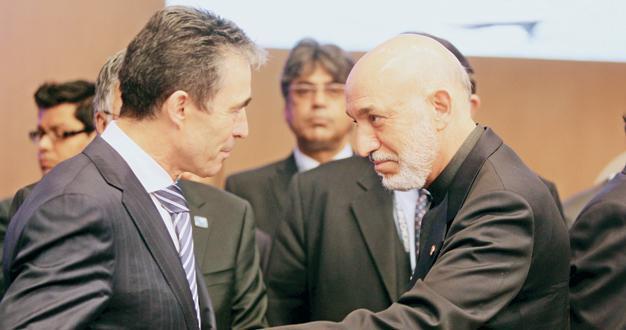Security pact with US at risk, says Afghan leader
KABUL / PARIS

Afghan President Hamid Karzai (R) meets NATO Secretary General Anders Fogh Rasmussen in NATO’s Chicago meeting in this May photo. Ties between Afghanistan and the alliance strained over the latest civilian killings, which later NATO apologized. ABACA Press photo
Afghanistan’s president has said the United States has put the two countries’ security pact at risk with a recent unilateral airstrike that killed 18 civilians, while a Taliban suicide bomber killed four French soldiers responding to a tipoff about a bomb hidden under a bridge.The violence on June 9 and the dispute highlight the muddled nature of the international mission in Afghanistan as NATO coalition countries try to shift to a training role in a country that is still very much at war.
The pact signed by the U.S. and Afghanistan in April put the Afghan government in charge of most such “special operations,” a move designed to resolve some of the longstanding tension.
No more air strikes in residential areas
However, presidential spokesman Aimal Faizi called the airstrike a “one-sided” decision that had not been coordinated with the Afghans. He said investigators told the president that Afghan forces had surrounded the house in question, but U.S. forces decided not to wait for them to try to flush out the militants and called in aircraft instead.
Karzai and his advisers decided that if such incidents happened in the future they would consider them a breach of the special operations pact, the spokesman said. If another unapproved airstrike occurs, Faizi said, the Afghan government will have to consider U.S. troops part of an “occupation.”
A presidential statement also said NATO would not conduct any more airstrikes in residential areas. “[The] NATO commander gave a commitment that his forces will not launch airstrikes in residential areas,” it said, according to Reuters.
Taliban closes schools
After the incident, Taliban militants ordered schools in the district to close for three days to mourn the dead, officials said. “The Taliban have threatened the residents and teachers to not go to schools for three days. They say it’s to mourn the deaths of the civilians,” district governor Sayed Wakil Agha told Agence France-Presse. Most schools closed after the warning, he added.
Taliban spokesman Zabihullah Mujahid attempted to play down the insurgents’ role in the school closures, saying that the “residents are behind this decision.”
French withdrawal
The latest turmoil came as French President François Hollande said France would begin its pullout from Afghanistan next month and complete it by the end of the year, after four French soldiers were killed by Taliban insurgents.
The withdrawal of French troops from Afghanistan was one of Hollande’s presidential electoral promises. It “will begin in the month of July, will be carried out and be completed at the end of 2012,” the French president said. “What happened does not change anything, it neither accelerates nor delays” withdrawal, he said. While some have called for the pullout to be sped up, “it is not possible to go faster,” he added.
According to the French Defense Ministry, the soldiers targeted in the attack June 9 were participating in a “control operation” in the province bordering Pakistan where insurgents are very active. Afghan Interior Ministry spokesman Sediq Sediqqi said the attacker was disguised as a woman wearing a burqa.
The French defense minister also headed to Afghanistan yesterday. There are about 130,000 NATO troops fighting alongside Afghan government forces against the Taliban insurgency. Analysts have expressed concern about NATO’s withdrawal, pointing out that Afghan forces have a mixed record at best and questioning whether a security vacuum will heighten violence, if not hasten a return to civil war.
















